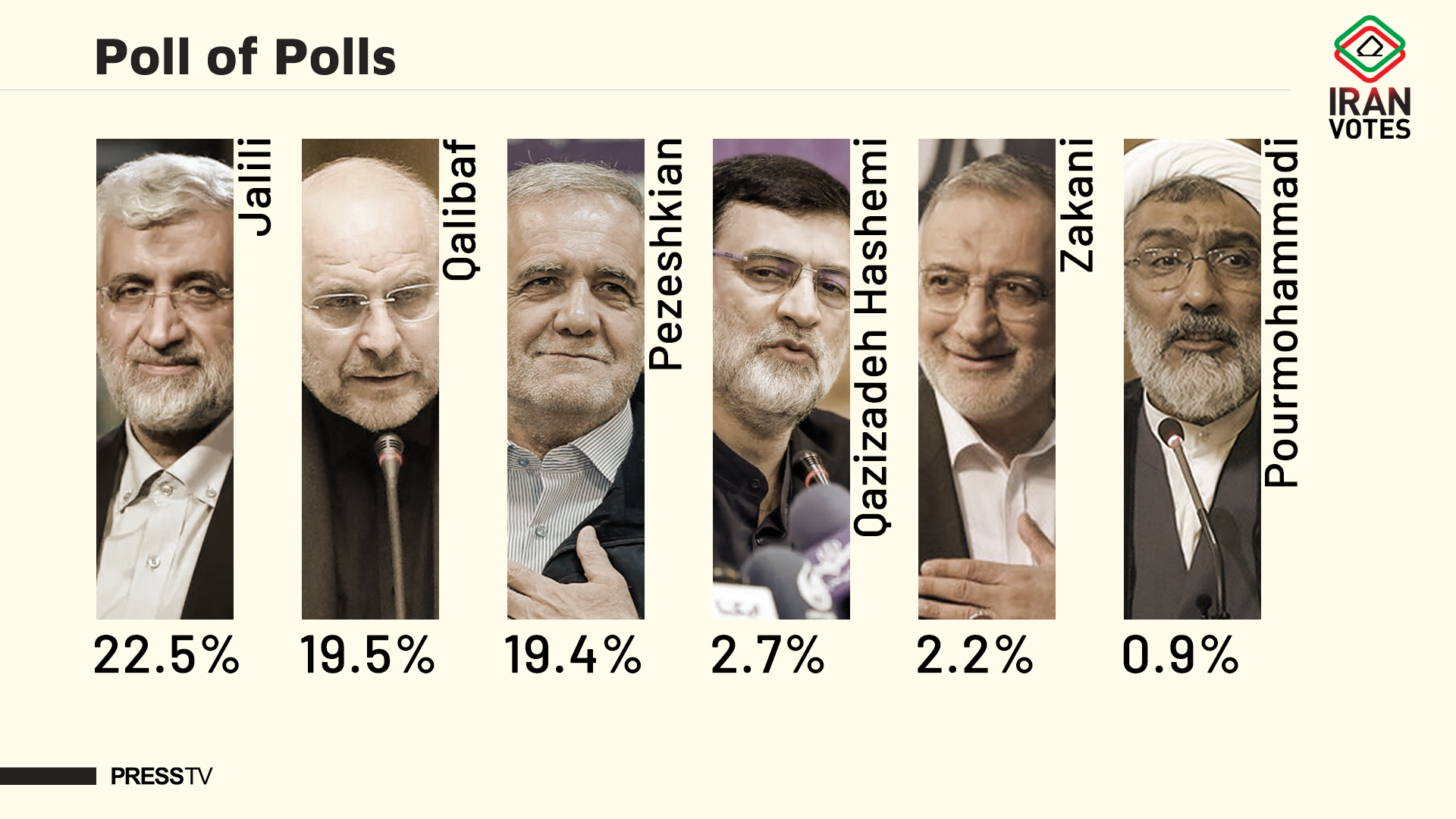World
Poll of Polls: Where do candidates stand ahead of June 28 presidential election

By Press TV Website Staff
With one week to go until the June 28 snap presidential election in the Islamic Republic of Iran, voters are weighing their options to elect the most efficient candidate.
According to the new “Poll of Polls,” Saeed Jalili, a veteran politician who previously served as the head of the country’s security body as well as the lead nuclear negotiator, has raced ahead of other contenders.
Released on Friday, the opinion poll, an interview-based pre-election field survey conducted by independent poll agencies, shows Jalili in a commanding position over other presidential hopefuls.
However, as the numbers reveal, it could be a tight race between Jalili, parliament speaker Mohammad Baqer Qalibaf, and senior lawmaker Masoud Pezeshkian, potentially leading to a second round of voting.
In the second part of the survey, comprising both respondents who would definitely and probably vote in the June 28 presidential election, Pezeshkian is presently positioned ahead of Jalili and Qalibaf.
The survey, conducted on June 18, 19, and 20, included respondents from Tehran, various other provinces, provincial capitals, and selected villages.
All participants in the most prestigious pre-election survey were over the age of 18.
Part 1: Those who would definitely vote
In the first part of survey, comprising those who said they would definitely cast their ballots in June 28 presidential election, 22.5 percent indicated they would vote for Jalili.
Qalibaf, the two-time parliament speaker and veteran lawmaker, is the next favorite choice, with 19.5 percent of respondents saying they would definitely vote for him.
Pezeshkian closely trails behind Qalibaf, with 19.4 percent backing the parliamentarian from northwestern Iran’s Tabriz city.
Amir-Hossein Qazizadeh Hashemi, the former lawmaker and current head of the foundation for martyrs and veterans, followed with 2.7 percent of respondents inclined to vote for him.
Alireza Zakani, the Mayor of Tehran and former lawmaker, is next on the list, with 2.2 percent of respondents saying they would cast their ballots in his favor.
Mostafa Pourmohammadi, the former minister of interior affairs and justice, figures at the bottom of the list, with only 0.9 percent of respondents favoring his candidacy.
According to the survey, 1.4 percent of respondents said they would vote for one of the candidates without specifying which one.
Additionally, 0.7 percent of respondents said they would cast a “white vote” (blank vote), not favoring any of the six candidates.
A significant 28.4 percent were still undecided about their preferred choice, despite their intention to vote.
Part 2: Those who would definitely and probably vote
In the second part of survey, comprising those who said they would definitely or probably vote on June 28, Pezeshkian emerged as the clear favorite, with 22.5 percent of respondents inclined towards him.
Jalili follows with 19.2 percent support, making it a close race between these two political stalwarts from different camps.
Qalibaf is next in line, with 18.5 percent of survey respondents indicating they would vote for him.
Qazizadeh Hashemi’s support among respondents did not see much difference from the first survey, with 2.8 percent backing him.
Zakani follows with 2.2 percent of respondents inclined to vote for him, and Pourmohammadi again ends up at the bottom with 0.9 percent support.
In this survey, 1 percent of respondents indicated they would cast a “white vote,” meaning they do not support any of the six candidates in the race.
A total of 28.9 percent were still undecided about their preferred choice, 1.7 percent said they would vote for one of the candidates, and 2.3 percent did not answer.
The six candidates running for the top executive office of the Islamic Republic, approved by the country’s top election supervisory body, are currently engaged in campaigning.
Voting will be held on June 28 both within the country and in designated polling stations in various countries for overseas Iranians.
In the previous survey, conducted on June 11, 12, and 13, which also included participants from Tehran, other provinces, provincial capitals, and selected villages, Qalibaf was ahead of other contenders.
In the latest survey, Jalili and Pezeshkian have made significant gains.







:max_bytes(150000):strip_icc()/roundup-writereditor-loved-deals-tout-f5de51f85de145b2b1eb99cdb7b6cb84.jpg)


